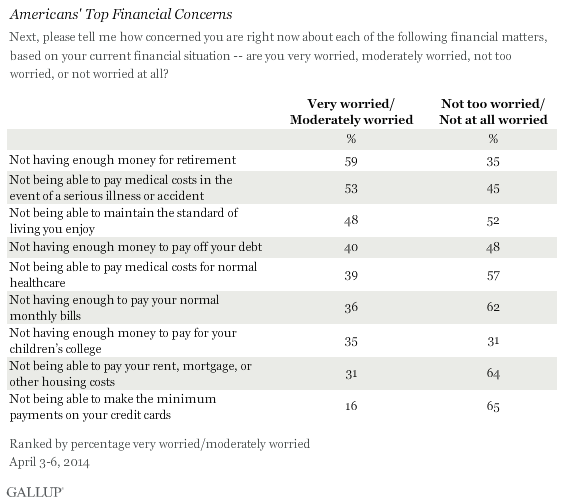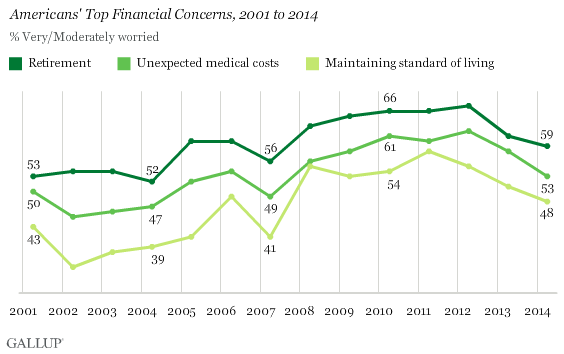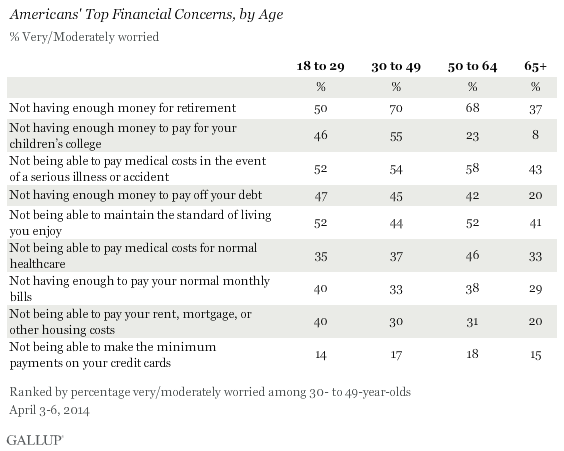WASHINGTON, D.C. -- A firm majority of Americans, 59%, are worried about not having enough money for retirement, surpassing eight other financial matters. A majority of Americans have reported being "very" or "moderately" worried about retirement savings every year since 2001, illustrating that saving for retirement disquiets Americans in both good and bad economic times.

These results are from Gallup's annual Economy and Personal Finance poll, conducted April 3-6 this year.
The next top concern, not being able to pay medical costs in the event of a serious illness or accident, worries 53% of Americans. This is down from a record high of 62% in 2012.
Third on the list of Americans' top financial worries is not being able to maintain the standard of living they enjoy, with nearly half of the country's adults citing this concern. Together, retirement savings, unexpected medical costs, and maintaining one's standard of living typically top the list of the eight financial items that Gallup has tracked annually since 2001. Concerns about all three are down modestly from two years ago, but are still higher than they were before the Great Recession.

Notably, four in 10 American adults say they are very or moderately worried about not having enough money to pay off their debt. This is the first time Gallup has included this financial issue. With as much as $1 trillion in outstanding student loan debt circulating in the U.S. today -- not to mention other prevalent types of debt such as credit cards -- debt concerns are clearly weighing on a significant proportion of the country.
Of the nine concerns tested, the bottom two concerns -- not being able to pay one's rent or mortgage, and not being able to make minimum payments on credit card bills -- are those most likely to indicate immediate insolvency. This finding suggests that most common financial problems are related more to savings and future expenditures than day-to-day living.
Middle-Aged Americans Most Worried About Retirement
Personal financial concerns vary significantly across age groups. The top problem for the broadly defined group of middle-aged Americans -- those aged 30 to 64 -- is not having enough money for retirement, in line with previous findings. For this group, about seven in 10 worry about not having enough money for retirement.

Young Americans aged 18 to 29 worry most about paying medical costs in the event of a serious illness or accident (52%), perhaps a result of the comparatively high uninsured rate for younger Americans or the lack of savings typically characterizing that age group. An equal share of 18- to 29-year-olds (52%) say they are worried about being able to maintain their standard of living. And nearly half of 18- to 29-year-olds worry about being able to pay off debt, perhaps a consequence of the massive amount of student loan debt that many young adults carry. Possibly befitting their youth and their longer distance in years from retirement, this group is least concerned about having enough money when they retire compared with other age groups -- despite dire predictions about the future of Medicare and Social Security.
Older Americans, those aged 65 or older, also worry most about being able to pay medical costs in the event of a serious illness or accident, though few in this age group lack health insurance. However, given the formidable cost of protracted, continual medical care that often characterizes older Americans' later years, many senior citizens may feel their health insurance alone cannot handle such a financial burden. Generally speaking, though, senior citizens are much less concerned about most of these financial problems than are their younger counterparts. The majority of older Americans appear to have retirement financing under control; 37% worry about having enough money in their retirement, by far the lowest percentage of any age group. Senior citizens are least concerned about not having enough money to pay for their children's college education (8%) -- presumably because older Americans already faced that challenge.
For Americans across all age groups, the ability to make minimum payments on credit card bills does not generate much concern.
Bottom Line
Retirement may be a time that many working adults look forward to, but it is paradoxically a source of stress in the here and now. A strong majority of Americans, particularly those aged 30 to 64, worry about having enough money for retirement, and this concern has regularly topped the list of Americans' top financial problems. The only other personal financial concern that a majority of Americans are very or moderately worried about is the ability to pay medical costs in the event of a serious accident or illness.
For a country that now has a life expectancy at birth of 78.7 years, retirement savings for post-work years is considered a matter of national importance. These concerns led President Barack Obama to propose a retirement savings account for working adults -- MyRA -- during this year's State of the Union address. It remains to be seen whether this new type of savings plan, which will be available in late 2014, will ultimately alleviate some Americans' concerns about retirement.
Additional insights on retirement are available through the Wells Fargo/Gallup Investor and Retirement Optimism Index. The Index provides quarterly updates on U.S. investors' economic optimism, as well as their views on a variety of savings and retirement issues.
Survey Methods
Results for this Gallup poll are based on telephone interviews conducted April 3-6, 2014, with a random sample of 1,026 adults, aged 18 and older, living in all 50 U.S. states and the District of Columbia.
For results based on the total sample of national adults, the margin of sampling error is ±4 percentage points at the 95% confidence level.
Interviews are conducted with respondents on landline telephones and cellular phones, with interviews conducted in Spanish for respondents who are primarily Spanish-speaking. Each sample of national adults includes a minimum quota of 50% cellphone respondents and 50% landline respondents, with additional minimum quotas by time zone within region. Landline and cellular telephone numbers are selected using random-digit-dial methods. Landline respondents are chosen at random within each household on the basis of which member had the most recent birthday.
Samples are weighted to correct for unequal selection probability, nonresponse, and double coverage of landline and cell users in the two sampling frames. They are also weighted to match the national demographics of gender, age, race, Hispanic ethnicity, education, region, population density, and phone status (cellphone only/landline only/both, and cellphone mostly). Demographic weighting targets are based on the most recent Current Population Survey figures for the aged 18 and older U.S. population. Phone status targets are based on the most recent National Health Interview Survey. Population density targets are based on the most recent U.S. census. All reported margins of sampling error include the computed design effects for weighting.
In addition to sampling error, question wording and practical difficulties in conducting surveys can introduce error or bias into the findings of public opinion polls.
View survey methodology, complete question responses, and trends.
For more details on Gallup's polling methodology, visit www.gallup.com.
